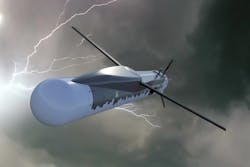British military seeks to develop cooperative missiles by enabling them to communicate with one another
LONDON – The United Kingdom Ministry of Defence is investing $4.8 million for the Co-operative Strike Weapons Technology Demonstrator (CSWTD) program to develop systems to enable missiles in flight to communicate with one another. New Atlas reports. Continue reading original article
The Military & Aerospace Electronics take:
13 July 2021 -- Back in the 1960s, the first laser-guided munitions, nicknamed smart bombs, simply could be steered toward their target by a pilot or weapons officer Five decades later we're seeing an emerging generation of weapons that are smart enough to gather data, assess situations, and alter their plans to achieve their objectives.
For such weapons to be effective, they need to operate as a team rather than in a top-down fashion. The current generation of missiles can talk to their launcher, but not to one another. This is a considerable drawback with weapons that are able to inform their fellow missiles about the current situation.
British military experts will look at developing new hardware and software that will make missiles more cooperative. The two-year project began in April 2021 and the new technology could be integrated into a smarter integrated network of missiles within five years.
Related: Making sense of sketchy or incomplete information
John Keller, chief editor
Military & Aerospace Electronics
